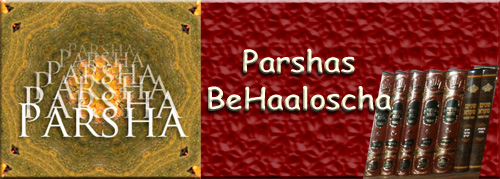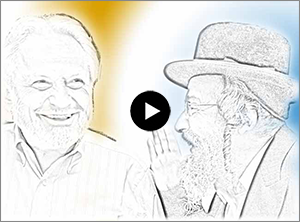Parshas BeHaaloscha 5771
I have been sitting on a question for decades which has to do with Parshas BeHaaloscha, (Parshat Behaalotcha) that suddenly this year I had an insight that may resolve the issue.
Searching for Jewish Beliefs? Click Here for my main article on Jewish Beliefs.
Fast of the First Born
I am a bechor. Every year on Erev Pesach we have the fast of the first born. It’s interesting when you learn the sugya from the Reshonim through the Mishna Brura that the issue of making a siyum to potor ourselves from the taanis, which is the accepted practice today in all circles with whom I am familiar, is almost a non-issue. It seems that in previous generations the bechors actually fasted.
Taanis Bechoros and Makas Bechoros
At any rate, as the reason for the taanis (taanit bechorot) the Mishna Brura brings from the Tur “in remembrance of the miracle that they were saved from Makas Bechoros.” This relates to what it says in our parsha (8,17), “Ki Li Kol Bechor … For all the firstborn of the children of Israel are Mine, both man and beast, on the day that I smote every firstborn in the land of Mitzrayim, I sanctified them for Myself.”
I ask: the whole concept of the ten plagues was only for the Mitzrim, not for the Yidden. Dam, they had to buy their water from us for that week, tzefardaya, kinim, these plagues were only for the Mitzrim. By arov the Almight’y said explicitly (8,18), “Ve’Hiflaisi … and I will separate in that day the land of Goshen in which My people dwell that no arov be there, in order that you should know that I am the L-d in the midst of the land. And I will put a division between My people and your people…” See the Ramban that even though the previous plagues were also just for the Mitzrim, still those plagues were relatively non-moving. But with wild animals it was an extra Kiddush Hashem that they stayed out of Goshen.
Then again for the plague of dever – VeHifla Hashem bain mikneh Yisroel lebain mikneh Mitzraim. And Pharaoh sent, and indeed there was not a single one of the cattle of Yisroel dead. With the hail also it says, “Only in the land of Goshen where the children of Yisroel were, there was no hail.”
Makas Bechoros was the shpitz of all of the plagues, delineated from the beginning: “Thus says the L-d, Yisroel is my son, my firstborn, and I say to you, let my son go, that he may serve Me, and if you refuse to let him go, indeed I will slay your son, your firstborn.”
Therefore I ask: why did there have to be a special protection for the Jewish firstborn, what was the miracle that they were saved? Why should they die? And additionally, why do the bechoros nowadays have to fast, lech’ora it would make more sense that the decendents of those original bechoros in Mitzraim should have to fast, because they are alive today because of the miracle. But what did I do?
I suggest to answer this question as follows, first prefacing another question. The kitrug at Yam Suf, Halalu etc. etc. (I invite you to read my article on the Seventh Day of Passover where I dealt with this issue in depth). I ask: why didn’t anybody think to stand up to the samech mem and answer him, “who told you that the Mitzrim are getting it over the head for Avoda Z, that you have such a kitrug? They’re getting their punishment because they unjustly persecuted the Jewish people all those years.”
The Reshonim speak about the question, what was the sin of the Mitzrim, wasn’t it the Divine plan that the Yidden go down to Egypt to be subjugated there? The Torah commentator Rashi, the Ramban, the Rambam. I don’t wish to go into this point here. But each one, according to how he resolves the question, will explain why the Egyptians got punished for what they did to the Yidden. So why can’t you say that the makos on the Yam were for that and not for Avoda Z?
I suggest to understand that it is within the realm of Heavenly Hashgocho to give collective corporal punishment to the nations where required. Yisurim, pain and suffering. And even though one particular individual may not have sinned per se, still oy lerasha oy leshchaino. But the death penalty, which was for every single soldier who was ordered to race after the Yidden to trap them on the banks of the sea, for this punishment it has to be that each individual was guilty for something for which he deserves the death penalty. I can easily imagine that not every single soldier in Pharaoh’s army was guilty of unjustly persecuting the Jews. Therefore the psak that everyone should die there on the yam had to be for something that everyone was indeed guilty of, A. Z. And so the kitrug, Yankeleh, you’re any better?
So too, in Makas Bechoros, a gevaldiga kliya, where each and every family lost at least one person, in particular the oldest child who stands after the parents as the head of the household, I can even more understand that not every single Egyptian firstborn was guilty for the sin of the generation, each Rishon according to how he learned. Therefore the psak had to be for something else, something that had to do with the intrinsic gadlus that the first born son should hold himself extra careful, “muram me’am”, in order to be a good example for the rest of the family and for society. Something for which everyone was indeed guilty, maybe the same sin for which they got it at Yam Suf. And in which case a similar (or perhaps the same) kitrug would have been there in Mitzrayim, and for that Hashem Yisborach had to save the Yiddishe bechoros.
* * * * *
I told the above Torah to my chavrusa and asked him if he ever heard an alternative explanation to my question on makos bechoros, and how did he learn himself all the years. He told me that he doesn’t remember seeing this question discussed, but that he always understood in the spirit of that which they say that the ten makos were keneged the 10 maamoros, and that makas bechoros was keneged the maamar of Beraishis. Therefore in Makos Bechoros there perforce had to be a bitul of the Beraishis, which would include the Yiddishe bechoros as well.






Leave A Response